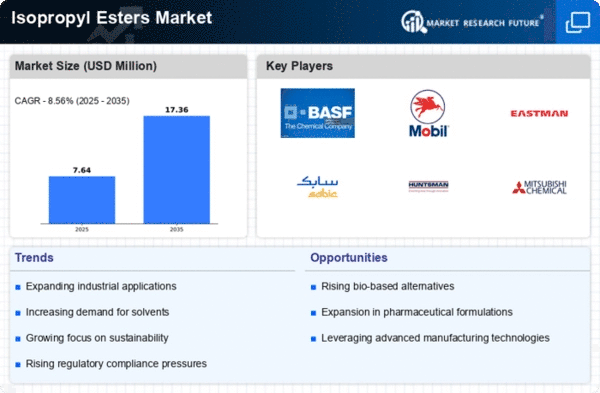Top Industry Leaders in the Isopropyl Esters Market

The seemingly unassuming world of isopropyl esters, derived from the ubiquitous isopropyl alcohol, paints a vibrant picture of a market poised for significant growth. This upward trajectory is orchestrated by a diverse array of factors: rising demand from varied industries, the unique properties of these esters, and ongoing innovations that unlock new applications. But beneath this harmonious melody lies a complex musical score, where different players compete for market share, employing distinct strategies and navigating dynamic trends.
Strategies Harmonizing the Market:
- Product Diversification: Leading players like BASF, Sigma-Aldrich, and Hangzhou Dayangchem Co. are expanding their portfolios, developing new isopropyl esters tailored to specific applications in pharmaceuticals, cosmetics, and agricultural chemicals.
- Sustainability Focus: With environmental concerns gaining traction, companies are investing in bio-based isopropyl esters derived from renewable resources like corn or sugarcane.
- Vertical Integration: Some players are pursuing vertical integration, acquiring raw material suppliers or expanding into downstream production of derivatives like isopropyl myristate, enhancing control over the value chain.
- Geographical Expansion: Emerging markets like China, India, and Southeast Asia offer immense potential. Companies are establishing production facilities and distribution networks in these regions to capture the surging demand.
- Partnerships and Acquisitions: Strategic partnerships and acquisitions are a common strategy to access new technologies, regional expertise, and customer bases, amplifying market reach and capabilities.
Factors Dictating Market Share:
- Production Capacity and Technology: Companies with large production capacities and access to advanced production technologies can cater to high demand volumes and offer competitive pricing.
- Brand Reputation and Customer Relationships: Established brands with strong reputations and long-standing customer relationships often enjoy market loyalty and a larger share of the pie.
- Product Portfolio Diversity: A diverse portfolio catering to various applications like lubricants, fragrances, and crop protection chemicals allows companies to attract a wider customer base.
- Cost Competitiveness: The highly competitive nature of the market necessitates efficient production processes and competitive pricing strategies to secure market share.
- Regulatory Compliance: Meeting stringent environmental and safety regulations, particularly in Europe and North America, is crucial for market access and customer trust.
Key Players:
- BASF SE (Germany),
- Procter & Gamble (U.S.),
- Oleon NV (Belgium),
- Sigma-Aldrich Co. LLC (U.S.),
- Hangzhou Dayangchem Co. Limited (China),
- Alfa Aesar,
- Thermo Fisher Scientific (U.S),
- Musim Mas Holdings. (Singapore),
- Shodhana Laboratories Ltd (India)
Recent Developments :
- September 2023: Several isopropyl ester producers announced price increases due to rising raw material costs and supply chain disruptions.
- October 2023: The American Chemical Society hosted its annual conference, focusing on advancements in isopropyl ester chemistry, sustainability initiatives, and market trends in the chemical industry.
- November 2023: A global study highlighted the potential of functionalized isopropyl esters that can impart unique properties like biodegradability or UV protection, opening up new avenues for product design and functionality.
- December 2023: The Chinese government announced plans to invest in the development of advanced isopropyl ester production technologies, aiming to strengthen domestic production and compete with global players.











